 Petzlover
PetzloverBoerboel is originated from South Africa but Bull and Terrier is originated from United Kingdom. Boerboel may grow 20 cm / 8 inches higher than Bull and Terrier. Boerboel may weigh 68 kg / 150 pounds more than Bull and Terrier. Both Boerboel and Bull and Terrier has almost same life span. Both Boerboel and Bull and Terrier has almost same litter size. Both Boerboel and Bull and Terrier requires Low Maintenance.
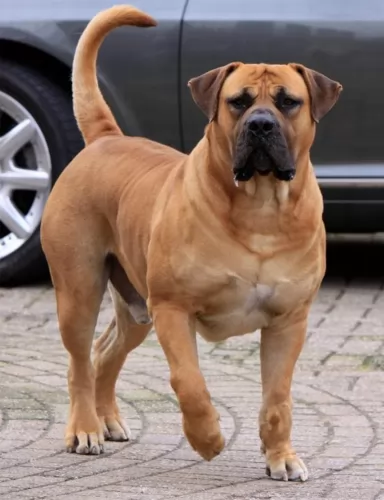 The name ‘Boerboel’ is derived from an Afrikaans/Dutch word, and the large Boerboel dog from South Africa has been specifically bred to be a farmer’s dog. Bred also to be a strong guard dog, the Boerboel is a mix of different African and European breeds, which in all likelihood, will include the Bullmastiff, the Rhodesian Ridgeback and the Bulldog. These dogs were used to hunt baboon and leopard.
The name ‘Boerboel’ is derived from an Afrikaans/Dutch word, and the large Boerboel dog from South Africa has been specifically bred to be a farmer’s dog. Bred also to be a strong guard dog, the Boerboel is a mix of different African and European breeds, which in all likelihood, will include the Bullmastiff, the Rhodesian Ridgeback and the Bulldog. These dogs were used to hunt baboon and leopard.
There is some information that suggests that the Boerboel was brought to South Africa by Jan van Riebeeck in 1652. Other information suggest that the dog is a descendant of the old Boer Hund, a powerful animal which was invaluable to the farmer.
In was in January 2010, that the American Boerboel Club was elected as the AKC’s Parent Club. The Boerboel was accepted into the Miscellaneous Class in the Working dog group.
The Bull and Terrier is a blend between a number of Old English Terriers and the Old English Bulldog. It is believed that this extinct dog was the start of breeds such as the American Pit Bull Terrier and the Staffordshire Bull Terrier.
They were excellent for hunting rats and weren’t a true breed. The dog was popular in the British Isles and in the United States in the 19th Century. They became rare as different varieties of Bull and Terrier were bred and standardized.
Most terriers have a good deal of Old English Bulldog blood in them so as to provide them with the courage to fight and hunt prey, while the English Terrier blood provided a feisty temperament and longer legs for speed.
Around 1860, the Bull and Terrier breed split into 2 categories – the pure white Bull Terrier and the ones of color. The Bull and Terrier was never recognized as a standardized breed by any of the kennel clubs.
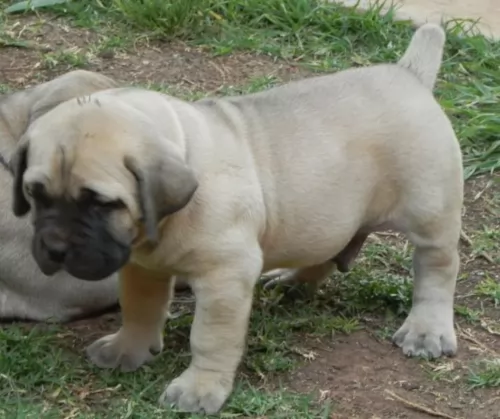 The Boerboel is a big, strong dog with powerful muscles. His height is between 61 – 66cm. He is similar looking to the Boxer dog, just heavier and bigger. The head of the dog is broad and big and the short, smooth coat can be of various shades, with breeders trying to achieve a single color of light tan and with no white. Their coats can also be red, different shades of brown and brindle.
The Boerboel is a big, strong dog with powerful muscles. His height is between 61 – 66cm. He is similar looking to the Boxer dog, just heavier and bigger. The head of the dog is broad and big and the short, smooth coat can be of various shades, with breeders trying to achieve a single color of light tan and with no white. Their coats can also be red, different shades of brown and brindle.
The dog has a black facial mask and the eyes are brown with the ears being of medium length and floppy. The Boerboel’s tail has always been docked, but today breeders are keeping the tail long. Many Boerboel lovers object to this, saying it detracts from the distinctive look of the Boerboel.
The Boerboel can be a wonderfully loyal and loving pet to their owners. They are territorial dogs and suspicious of strangers. This is a dog where it is imperative that they receive training and socialization as a puppy. They have leanings towards being aggressive so they wouldn’t be recommended to first time dog owners, unless of course the first time owners are firm and strong.
Boerboels raised the right way can be gentle giants. They often get bad publicity as regards to aggression, but this is because of they way they have been raised. Boerboels have been bred to be tough and fearless and they make excellent watchdogs. When raised and trained correctly, they make awesome, devoted companions, even around children and other pets.
There isn’t too much detail and information on the Bull and Terrier but we can be sure that with the cross between the Old English Bulldog and the Old English Terrier, he would have been a small to medium sized compact, muscular dog, standing roughly between 38cm to 50cm in height and weighing anything in the region of 11 to 22kg.
He would have had a big head, and most of the dogs had a medium to long tail. His coat was of many colors such as white, fawn, tan or brindle and would have been short and smooth.
As far as temperament goes, the Bull and Terrier would certainly be courageous, feisty, independent, strong and energetic. Socialization wasn’t available in those days but with training, this intelligent breed would be affectionate with his human family.
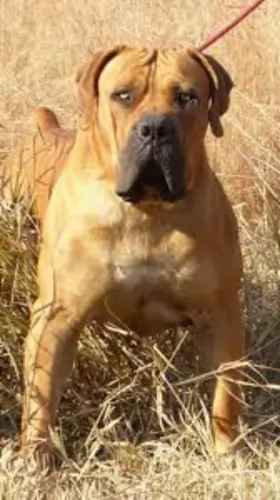 A well trained, socialized Boerboel makes a splendid pet. This is one breed known to have excellent guard- and watch dog characteristics. Boerboels are known for being protective when necessary. When not on guard, they make wonderful pets. He’ll need plenty of exercise, but he loves to also spend time indoors with his human family.
A well trained, socialized Boerboel makes a splendid pet. This is one breed known to have excellent guard- and watch dog characteristics. Boerboels are known for being protective when necessary. When not on guard, they make wonderful pets. He’ll need plenty of exercise, but he loves to also spend time indoors with his human family.
This a a bold, fearless dog who becomes devoted to his family. With the right training he is obedient and affectionate and knows how to behave appropriately indoors- and outdoors. For such a big dog, the African Boeboel’s temperament can be surprisingly gentle and affectionate around the family that he loves.
Nobody seems to be 100% sure when the classic Bull and Terrier dog became extinct but it is strongly assumed that it was some time between 1890 and 1920.
People believe that there are actually surviving breeds that could be considered Bull and Terriers. One thing is sure, when you consider that the Bull and Terrier is actually made up of several breeds such as the Bull Terrier, the Staffordshire Bull Terrier, Boston Terrier and American Pit Bull Terrier then you can imagine the character of the dog – brave, hardy, intelligent, feisty, bold, confident and fearless. He was a dog who loved his human family and would have been both friend and protector.
These dogs have been popular around the world, and have had a strong influence in the development of a number of other breeds. Even today, breeders are always looking at ways to develop new breeds based on the descendants of the Bull and Terrier.
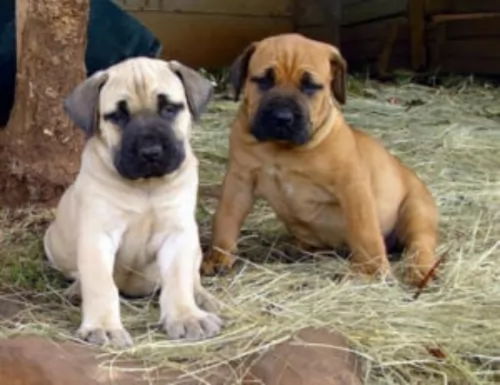 Many health problems experienced with any dog are found in the way dogs are fed, the way they are exercised and the way they are attended to when they are ill. Boerboels are healthy dogs and suffer fewer health defects than most similar breeds. The average life expectancy of a Boerboel is about 10 to 12 years. There are one or two health issues you’ll want to watch out for with your Boerboel.
Many health problems experienced with any dog are found in the way dogs are fed, the way they are exercised and the way they are attended to when they are ill. Boerboels are healthy dogs and suffer fewer health defects than most similar breeds. The average life expectancy of a Boerboel is about 10 to 12 years. There are one or two health issues you’ll want to watch out for with your Boerboel.
This aliment is typically found in large breed dogs. It’s a problem caused by a malformation of the hip joint. Over time hip dysplasia causes discomfort, pain and even arthritis and lameness. It is genetically inherited, with its severity being influenced by environmental factors. There are treatments available to alleviate the symptoms and make the dog more comfortable.
The Boerboel has plenty of muscle mass, and because he is such a large dog with a big appetite, he can lean towards obesity. Plenty of activities will be imperative to maintain muscle mass and ward off obesity. Over-eating suppresses the immune system, so over-feeding your dog simply contributes to ill health.
The Bull and Terrier was no doubt a robust breed with few health issues. However his owners of that time would have had to be aware of eye diseases such as cataracts that could have lead to blindness.
Other health issues they would have had to contend with would have been hip and elbow dysplasia, a disease which can cause lameness in a dog accompanied with pain. Because the Bull and terrier was mixed with the English Bulldog, the dog owners would have had to be aware of respiratory health problems, as the Bull dog is a breed that is susceptible to these problems.
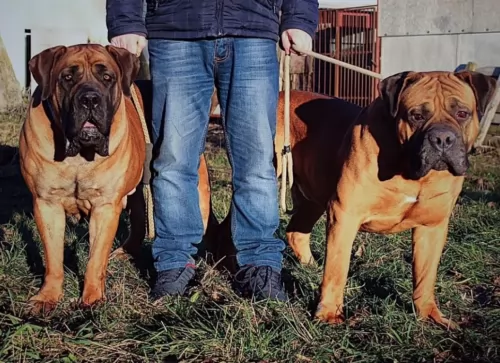 Boerboels are a robust breed and their short hair doesn’t shed heavily. Your Boerbul will require a thorough brushing twice a week to remove loose hair and to keep the coat shiny and healthy.
Boerboels are a robust breed and their short hair doesn’t shed heavily. Your Boerbul will require a thorough brushing twice a week to remove loose hair and to keep the coat shiny and healthy.
Boerboels, just like any other dog, should have their teeth brushed regularly to prevent tartar and plaque build-up. Left unattended, your pet can battle with tooth decay and gum disease.
Your Boerboel puppy will need ‘large breed puppy’ dog food. Speak to your veterinarian about wet- or dry kibble choices. An adult Boerboel will certainly need raw meat in his diet. When you do research, you find that the best Boerboel breeders are advocates for raw feeding. Home made food with rice, vegetables and meat as well as the best quality commercially manufactured dog foods for large breeds are excellent choices but raw meat is imperative as part of every dog’s diet.
Long ago the Bull and Terrier was developed to be a hunting dog, and because he was a blend of the English Bulldog and Terriers such as the Staffordshire Bull Terrier and English Terrier, he no doubt had a short coat that would have required being brushed down from time to time.
The Bull and Terrier dog was bred for hunting, and he would have in all likelihood have caught some of his own food. He would therefore have got a lot of protein in. His owners would also have fed him some of their own food too which would have been eggs, home-made bread, rice, fresh vegetables and meat.
He would have had a good quota of raw meat in his diet too and this would have ensured that his coat was shiny and glossy, free of rashes. Dogs such as the Bull and Terrier wouldn’t have eaten commercially produced kibble as that was only introduced in the 1930s.